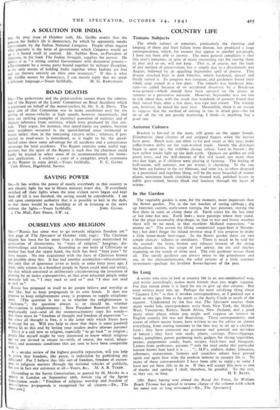OURSELVES AND RELIGION
Sirs,—" Russia has some way to go towards religious freedom yet " (fast page of The Spectator of October roth, 1941). The Christian religion has been for far more than a thousand years maintained by persecution of dissentients, by " wars of religion," hangings, dis- embowellings and burnings. According as one body of Christians or another has had the upper hand, the faith has been "kept pure" by these means. No one acquainted with the facts of Christian history can possibly deny this. It has had another accomplice—obscurantism. Not only that of ignorance (even as lately as some forty years ago, I think, only sixteen in a hundred people in Spain could read and write), but that which consisted in deliberately circumventing the invention of printing by an index expurgatorius, so that even educated people today seriously tell us, " I may read so and so " and " I may not read so and so."
Russia has proposed to itself to let people believe and worship as they like, but to keep propaganda in its own hands. It does not propose to keep enlightenment away, it proposes to supply enlighten- ment. (The question is not as to whether the enlightenment is "darkness "; the question always is, or should be, whether obscurantism is enlightenment.) Now President Roosevelt- has most emphatically said—and all the reconstructionists copy his words— that there must be " freedom of thought and freedom of expression "- but since all thought is free, it is the latter only which States have to secure for us. Will you help to show that there is some goodwill among us to this end by letting your readers audire alterarn partem? There is a .call now to religion, especially " to go back " to religion ; People like myself might be very interested to know which religious age we are invited to return to—with, of course, the social, educa- tional, and economic conditions that are seen to have been compatible with it.
As a secular review of the highest possible reputation, will you help to prove that freedom, like peace, is indivisible by publishing my criticism? For I believe that this sort of freedom, freedom of expres- sion in religious matiers through the national vehicles of publicity, has not in fact any existence at all.—Yours, &c., M. A. R. TUKER.
[According to the Soviet Constitution, as quoted by M. Maisky in a tPeech in London on September 26th, Article 124 of the Spviet Constitution reads: " Freedom of religious worship and freedom of anti-religious propaganda is recognised for all citizens.—En., The Spectator.]


























 Previous page
Previous page